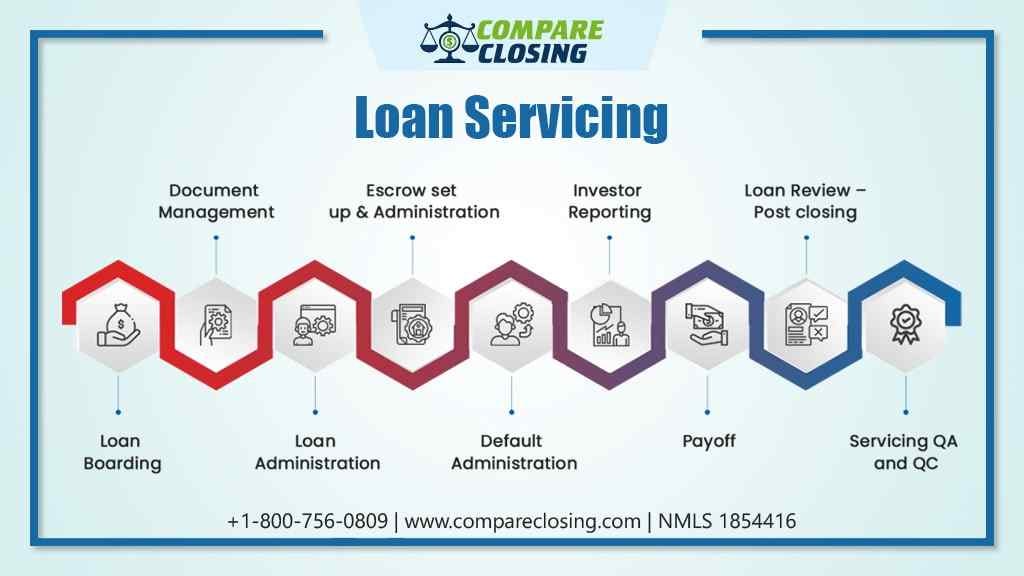
Introduction Loan Servicing
When most people buy a property, they take out a mortgage. The homebuyer will make a down payment which is a portion of the property sales price and the remaining portion is covered by a mortgage through a mortgage lender.
However, once the loan is closed there could be another party involved known as a mortgage loan servicer.
In this post, we will understand what is loan servicing and how it works in detail.
What Is Loan Servicing?
Loan servicing is a service provided by either a financial institution or a third party to service a mortgage loan.
In mortgage loan servicing, once the loan is disbursed to the borrower, the servicing could be outsourced to a different entity.
The responsibilities of a loan servicer are to collect a monthly payment, manage escrow accounts, update the borrower with monthly mortgage statements, and assist the borrower in any queries regarding the loan.
How Does Loan Servicing Work?
The loan servicers are sitting right between the homeowners and the investors who have bought the loans from the market in form of bonds or mortgage-backed securities.
The loan servicers are the single point of contact for the borrowers concerning their mortgage issues and queries once the home loan is closed by the lender.
The mortgage servicer will collect the mortgage payments from the borrower and pass those payments to the homeowner’s insurance company, tax departments, and the investors through the escrow account.
The mortgage loan servicer plays a significant role in assisting borrowers that are unable to make their mortgage payments by finding a way to keep them current on their mortgage and avoid losing their homes to foreclosure.
The loan servicers also work towards securing the inventor’s interest in the mortgaged property.
Once the loan is closed by the lender, they will decide which loan servicing company will service the loan.
Some lenders service their loans; whereas other lenders will sell the servicing rights to a third-party company.
The mortgage loan servicers receive a fixed percentage of the unpaid principal balance and keep a certain amount of fees that they charge the borrowers.
Loan servicing fees are charged to the borrowers where they are making the payments on time and also if the payments are missed by the borrower. Usually, the loans with missed payments are very low in number.
However, during the financial crisis, millions of homeowners were delinquent and needed assistance from their loan servicers.
The loan servicers did not have enough manpower and technology to help assist these homeowners at the time.
When a homeowner defaults on a loan, it is the loan servicer’s responsibility to get the loan to its current status.
The first job of the loan servicer, in this case, is to ensure that the homeowner is not losing his/her home. There are many ways to help such homeowners like forbearance, repayment plans, or loan modification.
If none of the options work, the loan servicing company can initiate a short sale of the home, a deed in lieu of foreclosure, or a foreclosure.
For the foreclosed properties, the loan servicer will have to take responsibility for maintaining the property by making necessary repairs and ensuring that the property stays in good condition until it is purchased by another buyer.
Maintaining the property will help keep the value of the home at its best and also avoid an unsafe environment in the neighborhood.
Conclusion
Loan servicing in a mortgage is very common and most banks and lenders work on this module.
As the loan servicing company is selected by the lender, the homeowner is not able to choose the loan servicing company.
The homeowner does not have any right or choice if the mortgage loan servicing company is changed during the tenure of the loan.
Many times the changes in the loan servicing company may cause a lot of confusion and sometimes delays in recording the borrower’s mortgage payments.
As a homeowner, it is important to know who your loan servicer is and have all the necessary contact details handy in the event you have any issue regarding the loan.
Comments
Post a Comment